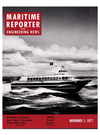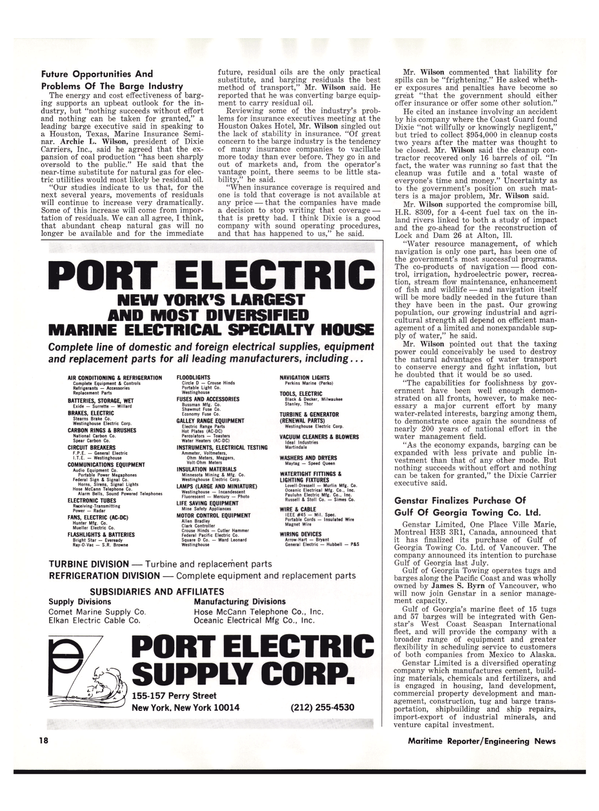
Future Opportunities And Problems Of The Barge Industry
The energy and cost effectiveness of barging supports an upbeat outlook for the industry, but "nothing succeeds without effort and nothing can be taken for granted," a leading barge executive said in speaking to a Houston, Texas, Marine Insurance Seminar.
Archie L. Wilson, president of Dixie Carriers, Inc., said he agreed that the expansion of coal production "has been sharply oversold to the public." He said that the near-time substitute for natural gas for electric utilities would most likely be residual oil.
"Our studies indicate to us that, for the next several years, movements of residuals will continue to increase very dramatically.
Some of this increase will come from importation of residuals. We can all agree, I think, that abundant cheap natural gas will no longer be available and for the immediate future, residual oils are the only practical substitute, and barging residuals the best method of transport," Mr. Wilson said. He reported that he was converting barge equipment to carry residual oil.
Reviewing some of the industry's problems for insurance executives meeting at the Houston Oakes Hotel, Mr. Wilson singled out the lack of stability in insurance. "Of great concern to the barge industry is the tendency of many insurance companies to vacillate more today than ever before. They go in and out of markets and, from the operator's vantage point, there seems to be little stability," he said.
"When insurance coverage is required and one is told that coverage is not available at any price — that the companies have made a decision to stop writing that coverage — that is pretty bad. I think Dixie is a good company with sound operating procedures, and that has happened to us," he said.
Mr. Wilson commented that liability for spills can be "frightening." He asked whether exposures and penalties have become so great "that the government should either offer insurance or offer some other solution." He cited an instance involving an accident by his company where the Coast Guard found Dixie "not willfully or knowingly negligent," but tried to collect $954,000 in cleanup costs two years after the matter was thought to be closed. Mr. Wilson said the cleanup contractor recovered only 16 barrels of oil. "In fact, the water was running so fast that the cleanup was futile and a total waste of everyone's time and money." Uncertainty as to the government's position on such matters is a major problem, Mr. Wilson said.
Mr. Wilson supported the compromise bill, H.R. 8309, for a 4-cent fuel tax on the inland rivers linked to both a study of impact and the go-ahead for the reconstruction of Lock and Dam 26 at Alton, 111.
"Water resource management, of which navigation is only one part, has been one of the government's most successful programs.
The co-products of navigation — flood control, irrigation, hydroelectric power, recreation, stream flow maintenance, enhancement of fish and wildlife — and navigation itself will be more badly needed in the future than they have been in the past. Our growing population, our growing industrial and agricultural strength all depend on efficient management of a limited and nonexpandable supply of water," he said.
Mr. Wilson pointed out that the taxing power could conceivably be used to destroy the natural advantages of water transport to conserve energy and fight inflation, but he doubted that it would be so used.
"The capabilities for foolishness by government have been well enough demonstrated on all fronts, however, to make necessary a major current effort by many water-related interests, barging among them, to demonstrate once again the soundness of nearly 200 years of national effort in the water management field.
"As the economy expands, barging can be expanded with less private and public investment than that of any other mode. But nothing succeeds without effort and nothing can be taken for granted," the Dixie Carrier executive said.
Read Future Opportunities And Problems Of The Barge Industry in Pdf, Flash or Html5 edition of November 1977 Maritime Reporter
Other stories from November 1977 issue
Content
- New York Harbor Containership Terminals Described In Brochure page: 4
- ARINC Awarded $117,000 MarAd Study Contract page: 4
- NASSCO Awarded $174 Million To Build Destroyer Tender page: 7
- Great Lakes Studies Awards Total $400,000 page: 7
- Second $81-Million Gulf Oil Supertanker Christened At Bethlehem Sparrows Point page: 7
- Bell Aerospace And Halter Marine To Develop New Class Of Commercial Surface Effect Ships page: 8
- Interesting Paper And Past Chairman's Night Opens Season For SNAME New York Section page: 8
- Veliotis To Manage Electric Boat Div. page: 8
- Sun Shipbuilding Consolidates All Marketing Activities —Orth, Winstead And Hunt Named Department Heads page: 10
- Samson Ocean Systems Names John Williamson Regional Manager page: 10
- SNAME 85th Annual Meeting page: 11
- Hartzman To Retire- Bossier Slated For Avondale Presidency page: 11
- American Export Lines $43.1-Million Title XI Approved By MarAd page: 13
- Douglas Oehrlein Joins Dravo SteelShip Corp. page: 13
- McAllister Brothers Names Donald Hankin VP-Engineering page: 14
- Improving Shipbuilding Productivity page: 14
- Ocean Orders Five More Ships page: 14
- British Rail Awards Ferry Contract To Harland And Wolff page: 17
- M a r i n e Boiler Reliability page: 17
- Future Opportunities And Problems Of The Barge Industry page: 18
- Navy Awards Boeing $178 Million To Build Missile Firing Boats page: 19
- Plan To Convert Three Vessels At Estimated Cost Of $12.8 Million page: 20
- Kleschick Elected To Sun Ship Board Of Directors page: 20
- ASRY Drydock Now Open To Service 500,000-DWT Vessels page: 22
- NASSCO Elects Giorgis Group Vice President page: 22
- Norshipco Adopts New Corporate Logo page: 22
- Cayman Energy Ltd. Reports On Activities page: 22
- Samson Sells Marine Survey Division To Local Management page: 22
- Ed Toale Joins Bailey Sales Staff page: 23
- Marine Firms Attend Hoffert Marine Seminar page: 23
- Small Security Vessel Symposium Set For London March 6-10 page: 24
- Bethlehem Steel San Francisco Shipyard Names William Hamilton page: 24
- $3-Million Surface Effect Ship Award To Philadelphia Gear page: 24
- Jonathan Feffer Named President SSI Navigation page: 24
- Navy Adds $4.2 Million To Tracor Contract page: 26
- C.F. Bean Corp. Names Charles R. Barron VP page: 26
- Argo International And Sealol Join Forces page: 27
- Space-Age Insulation Approved By Lloyd's page: 27
- Sperry's First Triple Flow Steering Systems Installed At NASSCO page: 28
- Raytheon Promotes A. Newell Garden page: 28
- National Steel And Shipbuilding Delivers Second Of Four 90,000-Ton Tankers To OSG page: 28
- W.A. Whitney Corp. Introduces New 28XX Tooling Catalog page: 29
- Swan Hunter To Build Vessel To Transport Spent Nuclear Fuels page: 29
- Twenty-Four Women Report For Sea Duty To U.S. Coast Guard page: 32
- GE Credit Buys Third 225,000-DWT Tanker From Seatrain Shipbuilding page: 33
- New York Port Engineers Hears Paper On Surface Preparation Of Steel page: 34
- SCR Propulsion System For Offshore Tug/Supply Vessels page: 34
- Floating Oil Storage Better Prospects For The Unemployed? page: 34
- Alaska Maritime Names William Lorch Valdez Port Manager page: 36
- No. New England Section Of ASNE Reports On Two Technical Sessions page: 36
- An Assessment Of The Market For Tankers Of 300,000-DWT And Over page: 37
- Moran-Thibodeaux Names Captain North Vice President-Sales page: 38
- Diamond Manufacturing Building Ro/Ro Dock For Port Of Tampa page: 38
- Newport News Shipyard Installs Powerful Hoists page: 39
- Kawasaki Endows M.l.T. Research Fund With Gift Of $200,000 page: 39
- Kawasaki Kobe Works Delivers World's First BORO Liner page: 40
- Todd Shipyards Corp. Holds Company Safety Conference In Chicago page: 40
- Study 56—'Sea Trade And Transportation Of Coal' page: 41
- Spanish Society And ABS Enter Agreement page: 42
- J.M. Ringelberg Joins Seaward International page: 42
- U Of California Gives Course On Deepsea Oil Structures Jan. '78 page: 43
- Slatic Named President Ameron Protective Coatings Division page: 43
- Two Management Appointments Announced At Skagit Corporation page: 44
- IMO Pump Bulletin Describes Twin Screw Pumps page: 44
- Drew Chemical Corp. Promotes Walter Smith page: 46
- Kaiser Building Fifteen Mammoth All-Welded Aluminum LNG Tanks For Ships At Avondale page: 46
- New England Company Receives U.S. Funds To Investigate Giant Sphere As Offshore Oil Terminal page: 46
- SNAME And SSC Plan Ship Vibration Symposium For Washington, D.C. October 1978 page: 47
- Electro-Nav To Market New 400-Watt SSB Transmitter/Receiver page: 48
- CIBRO Petroleum Building Super Barge At Todd Shipyards' Houston, Texas Division page: 48
- Stanley Stiansen Elected By ABS page: 49
- OMNITHRUSTER Names J. Michael Melvin VP page: 49
- Santa Fe Reenters Onshore Drilling !n The United States page: 49
- New Henschel Engine Order Telegraph Catalogs Available page: 50
- ASNE Flagship Section Holds First 1977-78 Meeting page: 50
- Wigham Poland Inc. Expands Marine Insurance Division page: 50
- Dredge Technology Corp. Formed In New York page: 53
- Port Of Hueneme Retains John J. McMullen Associates To Prepare Master Plan page: 54
- IMODCO Establishes Houston, Texas Office —M.D. Jackson Named page: 56
- Los Angeles Section's Opening Meeting page: 62
- ALCO Brochure Reports Engine Performance On Residual Fuel page: 64
- American Arabian Partnership Names John S. Hollett page: 64
- Nicholas Liberatore To Head International Activities For Genstar page: 66
- ABS Classes 127 New Vessels In September page: 67
- Belle River Sets Tonnage Record On Great Lakes page: 68
- Congressman Mario Biaggi Will Address First N.Y.C. Diving-Insurance Symposium page: 71
- Miles O'Harra Enters The Consulting Field page: 72
- Clean Venture, Inc. Formed By Spill Contractors To Cover Entire New York Harbor Area page: 73


